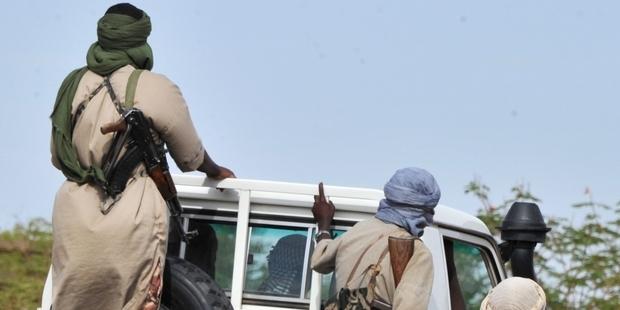
The ICC has announced it will open an investigation into crimes under international law committed in the year-long Mali conflict.© ISSOUF SANOGO/AFP/GettyImages
Mali is currently facing its most serious humanitarian and human rights crisis since its independence in 1960, with myriad rights abuses rampant, amounting to what may become charges of war crimes and/or crimes against humanity. Cue the International Criminal Court (ICC).
“The legal requirements have been met, we will investigate.”-ICC Chief Prosecutor Fatou Bensouda
Yesterday, the Chief Prosecutor of the ICC, Fatou Bensouda, announced the Court is officially opening an investigation into the situation in Mali. As you may know, the Malian authorities self-referred the situation to the Chief Prosecutor back in July of 2012. The investigation will certainly take some time, but this step represents hope for all those who believe that the most serious crimes under international law are of concern to all; therefore, all states must join together to investigate the crimes and bring those responsible to justice.
Amnesty welcomed the announcement about the investigation—as we’ve been urging the ICC to look into the situation in Mali since July—and we are urging the Court to fully investigate crimes committed by all parties across the full geography of the country.
http://youtu.be/CO-jurETDgY
But what does this announcement really mean? Here are three important things to know about the ICC and Mali.
1. No one is above (or outside of) the law
Armed Islamist groups, other armed opposition groups, self-defence militias, the Malian military and other state security agents, the French Armed Forces, any other party to the hostilities… no one should be exempt from the Court’s investigation if they are credibly accused of crimes under the Court’s jurisdiction. And all eyes are now on Mali, so perpetrators (and would-be perpetrators) take note: all actors participating in hostilities MUST adhere to their obligations under international human rights and humanitarian law.
The Rome Statute, which established the ICC and provides the framework within which the court operates, details the crimes the court has jurisdiction over, including war crimes, crimes against humanity, genocide and the crime of aggression (subject to certain conditions being met which are not applicable to the current situation in Mali).
Finally, the court has jurisdiction over ALL of Mali, not just the north or the south of the country. Despite the focus of the investigation (as announced by the Chief Prosecutor) being on the three northern regions of Mali, it remains vital the Court investigates incidents which have occurred in the south of the country such as the torture, disappearances and extrajudicial execution of soldiers held in detention facilities by the military junta in areas such as Bamako and Kati military camp.
2. The ICC can help, but it alone cannot “fix” Mali
It’s going to take a concerted international, regional and domestic effort to improve the situation in Mali, which is very complex, as my colleague Scott detailed here. Despite many warnings of a mounting human rights and humanitarian catastrophe, the situation was allowed to deteriorate, and there is now no simple solution to mitigate suffering.
There are far too many individuals with blood on their hands at this point, some which have found their way (or have remained) in the state’s security apparatus, for the ICC to prosecute.
But the ICC was never intended to replace or absolve a state’s responsibility to investigate and prosecute abuses committed on its soil or by its nationals. Instead, it is to serve as a safety net and, through its investigations and prosecution of those most responsible, to spur and support domestic courts to fairly carry out their own prosecutions. Therefore, the international community must ensure that Malian authorities investigate and prosecute—in accordance with internationally recognized standards of fair trials—any crimes committed by any armed personnel in Mali. This means providing resources and support to the Malian authorities to be able to do this themselves or with the assistance of regional and or international partners should they request it.
Right now, it is vital for the international community to do its part to ensure impunity does not prevail. An immediate first step, in addition to supporting the investigation by the ICC, is to deploy human rights monitors with the resources to be able to do their job. This will aid in current documentation and future accountability efforts and is vital to the protection and preservation of human rights—especially for those who are most affected by this conflict. The ICC will only be looking into the crimes within its jurisdiction, and it is vital not to neglect the spectrum of the human rights abuses that have, or may soon, be committed.
3. The opening of this investigation by the ICC into Mali is another milestone for international justice
For valid reasons, the ICC and other international justice mechanisms have sometimes been criticized for being too slow. In the case of Mali, the ICC acted expeditiously by announcing the opening of an investigation within six months of receiving the self-referral from the Malian authorities. This demonstrates that the Court can help to deter crimes – and possibly help end conflict – in real time, and not only through post-conflict investigation and prosecution.
Promising news in the midst of the conflict is what I’m calling it, and it’s a staunch reminder to perpetrators of rights abuses in Mali right now: your actions will not go unnoticed and you will be held accountable for them. So let’s all join together and demand justice.
The land where they religiously respect their laws and policies.
I must appreciate you for coming up with such an informative post about the African country, Mali in this post. The fact that Mali has been facing a crisis in terms of human laws is absolutely true and I had read about it in the newspapers as well.outlookexpresshelp.com